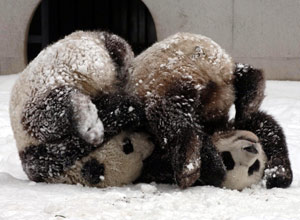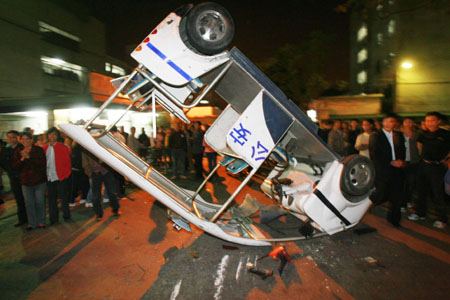
Meet Tuan Tuan and Yuan Yuan, whose combined names means reunion. These two national treasures are goodwill gifts to Taiwan, where the pandas will live in the island's most visited zoo.
A plane arrived in Chengdu, the "hometown of the Giant panda" according to the CCTV advertisements, to pick up the pandas about midday today. CCTV's foreign language news channel has been following the story since midday with hourly updates. READ MORE HERE
Two handlers will accompany Tuan Tuan and Yuan Yuan on their trying 3-hour flight to Taiwan with comfort food like steamed corn buns and motion sickness pills, according to Xinhua.net.
The Giant Panda, otherwise known as China's obsession, is among the most endangered animals in the world, with only about 1,500 left alive. Most pandas, or 熊猫 xiong mao (literally bear cat), live in Sichuan and areas that were hard hit by the Spring earthquake. The bear cat needs basically untouched wilderness and calm to feel comfortable mating with other bear cats. This means the earthquake has upturned the mating cycle of the already endangered animal.
It's easy to understand Chinese people's love affair with the Giant panda; I mean, they're stupidly cute. However, the extent of love for this coddled animal that would probably be extinct if left to its own devices is incredible. Tuan Tuan and Yuan Yuan will get a week's supply of steamed corn buns--a delicacy difficult to find in the wilderness of the Sichuanese mountains. My tutor, Liu Xiao Qian, collects everything panda-related and now is on the hunt for a back pack that actually looks like a panda is hugging you from behind. When she hasn't slept and gets dark circles under her eyes, she tells me, "Look! I look like a panda!" I've heard from at least one student and a few other friends that foreigners are compared to pandas because, like the Great Panda, we're both helpless, fat and kind of stupid.
Pandas may be cuter than foreigners, but at least we're not terrible at mating.







 In a country that doesn't celebrate Christmas, national idol Jackie Chan takes it upon himself to post directions for how to celebrate Christmas on his
In a country that doesn't celebrate Christmas, national idol Jackie Chan takes it upon himself to post directions for how to celebrate Christmas on his 






























